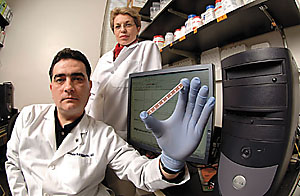 | Dr. Irina Buhimschi (standing) with co-author Catalin Buhimschi. |
Abnormal proteins in amniotic fluid that signal a higher risk of delivering prematurely are being detected with increasing accuracy by Yale School of Medicine researchers who presented their work in two abstracts at the Society for Maternal-Fetal Medicine Conference Feb. 8 in San Francisco.
In both studies, the researchers demonstrated that women with abnormal proteomic profiles (MR scores) are more likely to have inflammation and infection. The researchers previously developed the novel MR scoring method to discriminate healthy from diseased women in whom preterm delivery is impending and the health of the fetus is in danger. MR scoring relies on identification of a group of proteins that serve as biomarkers characteristic to women who will deliver preterm.
A normal MR score is 0 and a score of 3-4 is indicative of infection. The proteins detected are human neutrophil defensin 1, human neutrophil defensin 2, calgranulin C and calgranulin A.
About 50% of women who deliver prematurely have evidence of inflammation in the amniotic fluid. While there are many proteins in the amniotic fluid, not all of these are biomarkers with diagnostic significance.
The research team analyzed and generated MR scores for amniotic fluid taken from 123 women admitted to the Labor and Birth Unit or the prenatal units at Yale-New Haven Hospital. They found a direct relationship between the degree of amniotic fluid inflammation as indicated by the MR score, and the severity of infection in the placenta and umbilical cord.
"Our data suggest that at the time of amniocentesis and prior to delivery of the fetus, clinicians can be reassured by the absence of inflammation in a patient with an MR score of '0.' Or they can initiate aggressive therapy immediately following delivery when there is an MR score of 3 or 4," says the first author on the abstracts Dr. Irina Buhimschi, assistant professor in the Department of Obstetrics, Gynecology & Reproductive Sciences at the School of Medicine.
Buhimschi says that neonates born to women with an MR score of 3-4 had an increased incidence of infection. They also found that calgranulin C most accurately predicted inflammatory cell infiltration of the umbilical cord, and calgranulin A reflected more advanced inflammation, which is predictive of early-onset neonatal infection.
"Early recognition, diagnosis and treatment of neonatal infection are important aspects of the current clinical practice," says Buhimschi. "Therefore, prospective randomized studies to determine the appropriate treatment of newborns based on the MR score are highly desirable."
Authors on the abstracts included Christian Pettker, Lissa Magliore, Stephen Thung, Guomao Zhao, Carolyn Salafia, Catalin Buhimschi, Sonya Victor Rosenberg and Sonya Abdel-Razeq.
-- All Stories by Karen Peart
T H I S
Advanced proteomic technology
more accurately predicts prematurity W E E K ' S
W E E K ' S S T O R I E S
S T O R I E S![]()
 Faculty committee proposes changes to tenure policies
Faculty committee proposes changes to tenure policies![]()
![]()
 Yale to consider feasibility of adding two residential colleges
Yale to consider feasibility of adding two residential colleges![]()
![]()
 New Yale chaplain will aim to engage people of all faiths
New Yale chaplain will aim to engage people of all faiths![]()
![]()
 Student finds unforgettable world in ocean's searing depths
Student finds unforgettable world in ocean's searing depths![]()
![]()
 Yale biologists 'trick' viruses into extinction
Yale biologists 'trick' viruses into extinction![]()
![]()
 Yale scientists design a molecule that mimics the structure . . .
Yale scientists design a molecule that mimics the structure . . .![]()
![]()
 Kazakhstan's ambassador to the U.S. and Canada will discuss . . .
Kazakhstan's ambassador to the U.S. and Canada will discuss . . .![]()
![]()
 Discoveries from Yale Ob/Gyn
Discoveries from Yale Ob/Gyn
 First-degree fetal heart block may be reversible with early treatment
First-degree fetal heart block may be reversible with early treatment![]()
 3-D ultrasound identifies women at risk for impending preterm birth
3-D ultrasound identifies women at risk for impending preterm birth![]()
 Pregnancy at age 40 and over closely linked to likelihood of stillbirth
Pregnancy at age 40 and over closely linked to likelihood of stillbirth![]()
 Advanced proteomic technology more accurately predicts prematurity
Advanced proteomic technology more accurately predicts prematurity![]()
![]()
 Event celebrates renowned poet W.H. Auden
Event celebrates renowned poet W.H. Auden![]()
![]()
 Week-long series of events designed to raise awareness about Islam
Week-long series of events designed to raise awareness about Islam![]()
![]()
 Rebellious Lawyering Conference to explore progressive approaches . . .
Rebellious Lawyering Conference to explore progressive approaches . . .![]()
![]()
 IN MEMORIAM
IN MEMORIAM
 William A. Chupka, played leading role in the development of . . .
William A. Chupka, played leading role in the development of . . .![]()
 Dr. Aaron Lerner, founding chair of the dermatology department . . .
Dr. Aaron Lerner, founding chair of the dermatology department . . .![]()
 Nelson Polsby, former president of the University Council
Nelson Polsby, former president of the University Council![]()
![]()
 U.S.-China Forum to focus on the global marketplace
U.S.-China Forum to focus on the global marketplace
![]()
![]()
 Recital will feature the winners of undergraduate music competition
Recital will feature the winners of undergraduate music competition
![]()
![]()
 Collection of Musical Instruments concert series to feature . . .
Collection of Musical Instruments concert series to feature . . .
![]()
![]()
 Campus Notes
Campus Notes
Bulletin Home |
| Visiting on Campus
Visiting on Campus |
| Calendar of Events
Calendar of Events |
| In the News
In the News![]()
Bulletin Board |
| Classified Ads
Classified Ads |
| Search Archives
Search Archives |
| Deadlines
Deadlines![]()
Bulletin Staff |
| Public Affairs
Public Affairs |
| News Releases
News Releases |
| E-Mail Us
E-Mail Us |
| Yale Home
Yale Home